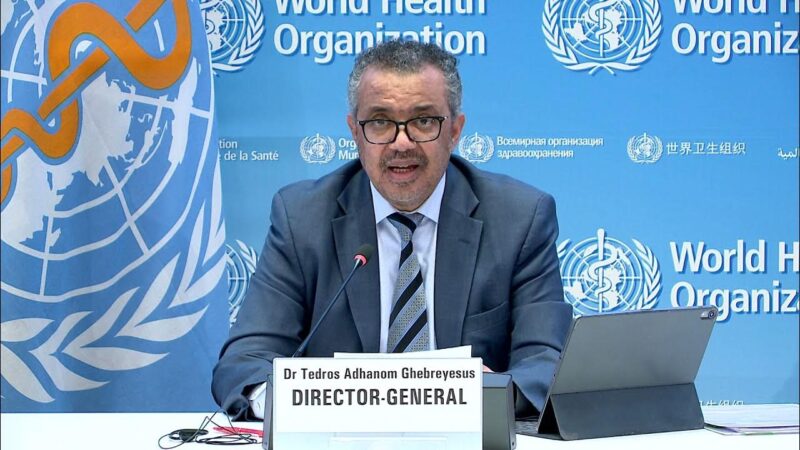In response to the alarming rise in dengue and other arboviral diseases globally, the World Health Organization (WHO) has launched an Urgent global plan aimed at tackling the increasing threat of these diseases, which have affected millions and put billions at risk.
The announcement was made on Thursday by WHO Director-General Dr. Tedros Adhanom Ghebreyesus, who emphasized the critical need for a comprehensive and coordinated strategy to combat the rapid spread of arboviral diseases, with dengue being identified as the most urgent threat.
At the launch event, Dr. Tedros highlighted the significant increase in dengue cases worldwide, stressing the importance of global collaboration in fighting the disease. “Dengue has emerged as the most pressing arbovirus disease,” Dr. Tedros stated, revealing that the number of dengue cases has nearly doubled each year since 2021.
By the end of August 2024, over 12.3 million cases had been reported, with more than 6,000 deaths, making dengue one of the most serious public health challenges today.
He called for action at all levels of society, urging individuals to maintain clean environments, support vector control measures, and seek timely medical attention if infected. “The rapid spread of dengue and other arboviral diseases is an alarming trend that demands a coordinated response across sectors and borders,” Dr. Tedros added, underscoring the urgency of global efforts to contain the crisis.
The Threat of Arboviral Diseases
Arboviruses are viruses transmitted to humans through arthropods such as mosquitoes, ticks, and other biting insects. Besides dengue, the plan focuses on other dangerous arboviral diseases such as Zika, chikungunya, and the Oropouche virus, which are spreading rapidly in various parts of the world, particularly in the Americas. These diseases pose severe health risks and can cause significant outbreaks that overwhelm healthcare systems in affected regions.
Dr. Raman Velayudhan, head of WHO’s Global Programme on Neglected Tropical Diseases, explained that unplanned urbanization, poor sanitation, climate change, and increased international travel are major contributing factors to the global rise of dengue and other arboviruses. “The disease is now endemic in more than 130 countries,” he said, highlighting the need for urgent and sustained action to control its spread.
According to WHO’s latest data, the Americas have been the most affected region, recording the majority of dengue cases in 2024. However, Africa is also experiencing a worrying increase, with more than 15,000 cases reported across 13 countries. The rise of dengue in African nations presents new challenges for a continent that is already battling other infectious diseases.
Severe cases of dengue, known as dengue hemorrhagic fever, can be fatal if left untreated, particularly in vulnerable populations such as newborns, the elderly, and individuals with pre-existing health conditions. WHO officials pointed out that newborns and those with compromised immune systems are at the highest risk of developing severe symptoms.
In addition to dengue, chikungunya, another mosquito-borne disease, continues to spread in several countries, particularly in Brazil, where the virus has caused a substantial number of infections.
Chikungunya can lead to severe joint pain and long-term complications, affecting a person’s quality of life for months or even years. Both diseases have proven fatal in some cases, further raising concerns about the need for stronger global health measures.
Dr. Diana Rojas Alvarez, WHO’s team lead on arboviruses, epidemic, and pandemic preparedness, warned of the diagnostic challenges in areas where multiple arboviruses circulate. Diseases like Zika and Oropouche often present symptoms similar to dengue, making it difficult for healthcare providers to diagnose them accurately. Misdiagnosis can lead to delayed treatment and increased risk of severe outcomes.
To address these issues, Dr. Alvarez stressed the importance of improving detection, surveillance, and testing systems, alongside raising public awareness about preventive measures. “Strengthening our surveillance systems and ensuring early detection will be key in preventing large outbreaks,” she said. Raising awareness among the public on how to protect themselves from mosquito bites and maintain proper sanitation practices are also essential components of the WHO’s plan.
The Five Pillars of WHO’s Global Arboviral Strategy
The WHO’s global plan focuses on five key areas:
- Strengthening Emergency Response Mechanisms: Countries are encouraged to develop and strengthen rapid response teams and strategies to contain outbreaks at an early stage.
- Enhancing Disease Detection and Surveillance: Robust surveillance systems are critical to track the spread of arboviral diseases, identify hotspots, and target interventions effectively.
- Implementing Preventive Measures: Efforts to reduce exposure to disease vectors, such as mosquito control programs and public awareness campaigns, must be scaled up in affected regions.
- Ensuring Access to Scalable Healthcare: Ensuring that vulnerable populations have access to timely and adequate medical care is a crucial part of minimizing the impact of arboviral diseases.
- Promoting Research and Development: WHO is calling for increased investment in research and development to create better treatments and vaccines for arboviral diseases. This includes the development of new technologies for vector control, such as genetically modified mosquitoes.
The WHO estimates that $55 million will be required over the next year to execute this ambitious global plan. The organization is urging international donors, governments, and private sector stakeholders to collaborate and provide the necessary resources to combat this growing threat.
Global Collaboration Is Key
The success of the WHO’s global initiative to fight dengue and other arboviral diseases hinges on the swift and coordinated actions of countries, health organizations, and individuals alike. The WHO is calling on nations to act quickly by implementing stronger health systems, adopting preventive measures, and funding research to tackle the diseases at their roots.
In closing, Dr. Tedros stressed that the time for action is now. “By acting swiftly and collaboratively, we can significantly reduce the escalating threat of arboviral diseases and protect millions of lives around the world.”










Join our Channel...